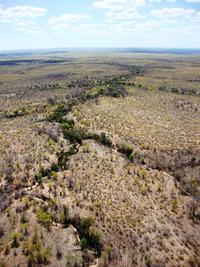Increased Aridity in Hwange Socio-Ecological System - SAVARID
Last update: 19 January 2018
Dates : 2012-2015
In Southern Africa, the predicted increase in ariditywill increase uncertainty of resource availability in space and time (surfacewater and forage), as well as decrease primary production. The land use mosaicshould evolve towards more pastoralism and the role of protected areas could becrucial as one of the land-use option. Understanding the responses of the keycomponent of these savanna systems to the increasing variability of rainfall intime and space is of primary importance to anticipate biome shifts, and theloss of identity of the biodiversity based savanna socio-ecological systems. The project will thus address the management ofprotected areas and their adequacy to sustainably meet their originalbiodiversity conservation objectives in the face of climate change as well asthe role of protected areas as ecosystem services providers for their broadersocio-ecological system.
Studying the effects of climate change on bioticinteractions is necessary to understand the response of ecosystem functions andtheir associated services. Our general objective here is to predict possibletrajectories of a biodiversity-based socio-ecological system (protected areaand its periphery) through understanding the functional relationships betweenthe key biotic drivers of semi-arid African savannas (plants, large herbivoresand humans) in response to variability and uncertainty in rainfall and surfacewater. Although the decrease in resource and increase in uncertainty may leadto increase in conflict locally, we hypothesise that the new constraintsimposed on the various production systems may create the conditions forpromoting a new integrated land-use system based on sustainable wildlife utilisation and biodiversityvaluation.
The study will be carried out within the Hwange LTER(Zone Atelier Hwange), thus benefiting from existing long-term data, fieldexperiment facilities, as well as strong collaborations between researchers,managers and the rural communities. The consortium gathered for this project ispluri-disciplinary and international, has common past research experience and along working experience in African savanna. These attributes thus offer a goodfeasibility and a high international visibility for this project.
Last update: 19 January 2018


